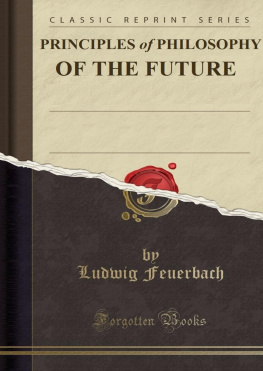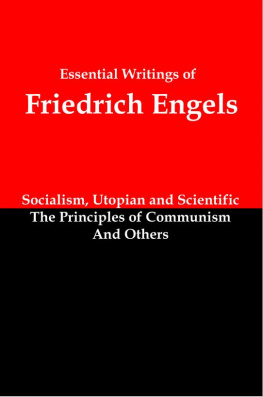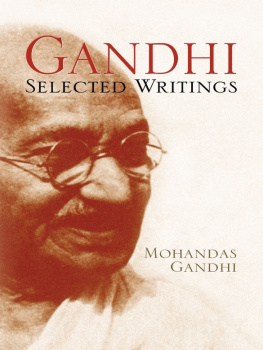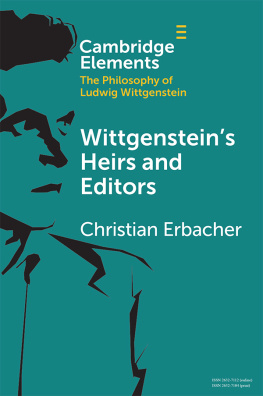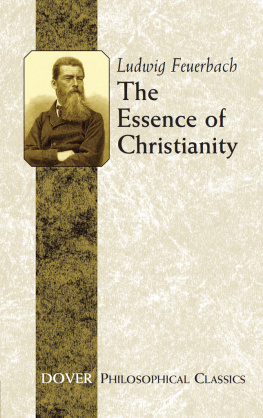Ludwig Feuerbach - Principles of the Philosophy of the Future
Here you can read online Ludwig Feuerbach - Principles of the Philosophy of the Future full text of the book (entire story) in english for free. Download pdf and epub, get meaning, cover and reviews about this ebook. year: 1843, genre: Religion. Description of the work, (preface) as well as reviews are available. Best literature library LitArk.com created for fans of good reading and offers a wide selection of genres:
Romance novel
Science fiction
Adventure
Detective
Science
History
Home and family
Prose
Art
Politics
Computer
Non-fiction
Religion
Business
Children
Humor
Choose a favorite category and find really read worthwhile books. Enjoy immersion in the world of imagination, feel the emotions of the characters or learn something new for yourself, make an fascinating discovery.
- Book:Principles of the Philosophy of the Future
- Author:
- Genre:
- Year:1843
- Rating:3 / 5
- Favourites:Add to favourites
- Your mark:
- 60
- 1
- 2
- 3
- 4
- 5
Principles of the Philosophy of the Future: summary, description and annotation
We offer to read an annotation, description, summary or preface (depends on what the author of the book "Principles of the Philosophy of the Future" wrote himself). If you haven't found the necessary information about the book — write in the comments, we will try to find it.
Principles of the Philosophy of the Future — read online for free the complete book (whole text) full work
Below is the text of the book, divided by pages. System saving the place of the last page read, allows you to conveniently read the book "Principles of the Philosophy of the Future" online for free, without having to search again every time where you left off. Put a bookmark, and you can go to the page where you finished reading at any time.
Font size:
Interval:
Bookmark:
Feuerbach
Principles of the Philosophy of the Future
The task of the modern era was the realisation and humanisation of God the transformation and dissolution of theology into anthropology.
The religious or practical form of this humanisation was Protestantism. The God who is man, that is to say the human God, Christ, this and only this is the God of Protestantism. Unlike Catholicism, Protestantism is no longer concerned with what God is in himself, but only with what he is for man; hence, it knows no speculative or contemplative tendency like Catholicism. It has ceased to be theology it is essentially Christology; that is, religious anthropology.
However, Protestantism negated God-in-himself or God as God for only God-in-himself is, strictly speaking, God only in practice; theoretically, it left him intact. He exists; however, not for man; that is, the religious man. He is a transcendent being or a being that will one day become an object for man up there in heaven. But that which is other-worldly to religion, is this-worldly to philosophy; what does not constitute an object for the former, does so precisely for the latter.
The rational or theoretical assimilation and dissolution of the God who is other-worldly to religion, and hence not given to it as an object, is the speculative philosophy.
The essence of speculative philosophy is nothing other than the rationalised, realised, actualised essence of God. The speculative philosophy is the true, consistent, rational theology.
Taken as an intelligible (geistig) or an abstract being, that is, regarded neither as human nor as sensuous, but rather as one that is an object for and accessible only to reason or intelligence, God qua God is nothing but the essence of reason itself. But, basing themselves rather on imagination, ordinary theology and Theism regard him as an independent being existing separately from reason. Under these circumstances, it is an inner, a sacred necessity that the essence of reason as distinguished from reason itself be at last identified with it and the divine being thus be apprehended, realised, as the essence of reason. It is on this necessity that the great historical significance of speculative philosophy rests. The proof of the proposition that the divine essence is the essence of reason or intelligence lies in the fact that the determinations or qualities of God, in so far as they are rational or intelligible and not determinations of sensuousness or imagination, are, in fact, qualities of reason.
God is the infinite being or the being without any limitations whatsoever. But what cannot be a limit or boundary on God can also not be a limit or boundary on reason. If, for example, God is elevated above all limitations of sensuousness, so, too, is reason. He who cannot conceive of any entity except as sensuous, that is, he whose reason is limited by sensuousness, can only have a God who is limited by sensuousness. Reason, which conceives God as an infinite being, conceives, in point of fact, its own infinity in God. What is divine to reason is also truly rational to it, or in other words, it is a being that perfectly corresponds to and satisfies it. That, however, in which a being finds satisfaction, is nothing but the being in which it encounters itself as its own object. He who finds satisfaction in a philosopher is himself of a philosophical nature. That he is of this nature is precisely what he and others encounter in this satisfaction. Reason does not, however, pause at the finite, sensuous things; it finds satisfaction in the infinite being alone that is to say, the essence of reason is disclosed to us primarily in the infinite being.
God is the necessary being. But his necessity rests on the ground that he is a rational, intelligent being. The ground for what the world or matter is does not lie in the world or matter itself, for it is completely indifferent to whether it is or is not, or to why it is so and not otherwise. [It is quite obvious that here, as in all sections where the problem is to deal with, and present the development, of historical phenomena, I do not speak and argue from my point of view, but rather let each phenomenon speak for itself. This applies to my treatment of theism here.] Hence, it must necessarily presuppose another being as its cause, a being that is intelligent and self-conscious and acts according to reasons and goals. For if this being were to be conceived of as lacking intelligence, the question as to its own ground must arise again. The primary and the highest being rests, therefore, on the presupposition that the intellect alone is the being that is primary, highest, necessary, and true. Just as the truth and reality of metaphysical or onto-theological determinations depend on their reducibility to psychological or rather anthropological determinations, so the necessity of the divine being in the old metaphysics or onto-theology has meaning, truth, and reality only in the psychological or anthropological characterisation of God as an intelligent being. The necessary being is one that it is necessary to think of, that must be affirmed absolutely and which it is simply impossible to deny or annul, but only to the extent to which it is a thinking being itself. Thus, it is its own necessity and reality which reason demonstrates in the necessary being.
God is unconditional, general 'God is not this or that particular thing' immutable, eternal, or timeless being. But absoluteness, immutability, eternality, and generality are, according to the judgment of metaphysical theology itself, also qualities of the truths or laws of reason, and hence the qualities of reason itself; for what else are these immutable, general, absolute, and universally valid truths of reason if not expressions of the essence of reason itself?
God is the independent, autonomous being not requiring any other being in order to exist, hence subsisting entirely by and through itself. But even this abstract, metaphysical characterisation has meaning and reality only as a definition of the essence of intelligence and, as such, it states only that God is a thinking and intelligent being or, vice versa, that the thinking being is the divine being; for only a sensuous being will need some other being outside itself in order to exist. I need air to breathe, water to drink, light to be able to see, plants and animals to eat, but nothing not directly at any rate in order to think. I cannot conceive of a breathing being without air, nor of a seeing being without light, but I can conceive of a thinking being as existing in complete isolation. A breathing being is necessarily referred to a being outside itself, that is to say, it has the essential object, through which it is what it is, outside itself, but the thinking being is referred only to itself, is its own object, carries its essence within itself and is what it is only through itself.
That which is object in theism is subject in speculative philosophy. That which is only the conceived and imagined essence of reason in theism, is the thinking essence of reason itself in speculative philosophy.
The theist represents to himself God as a personal being existing outside reason and man; as a subject, he thinks God as an object. He conceives God as a being, i.e., as an
Next pageFont size:
Interval:
Bookmark:
Similar books «Principles of the Philosophy of the Future»
Look at similar books to Principles of the Philosophy of the Future. We have selected literature similar in name and meaning in the hope of providing readers with more options to find new, interesting, not yet read works.
Discussion, reviews of the book Principles of the Philosophy of the Future and just readers' own opinions. Leave your comments, write what you think about the work, its meaning or the main characters. Specify what exactly you liked and what you didn't like, and why you think so.

